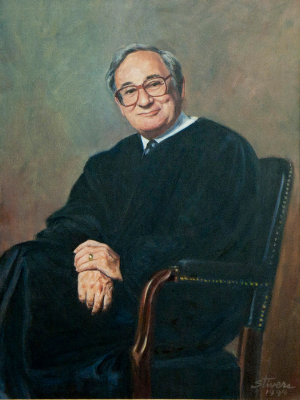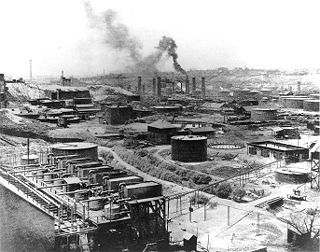Related Research Articles

United States of America v. Microsoft Corporation, 253 F.3d 34, was a landmark American antitrust law case at the United States Court of Appeals for the District of Columbia Circuit. The U.S. government accused Microsoft of illegally monopolizing the web browser market for Windows, primarily through the legal and technical restrictions it put on the abilities of PC manufacturers (OEMs) and users to uninstall Internet Explorer and use other programs such as Netscape and Java.
The Kingsbury Commitment is a 1913 out-of-court settlement of the United States government's antitrust challenge against the American Telephone and Telegraph Company (AT&T) for the company's then-growing vertical monopoly in the telecommunication industry. In return for the government's agreement not to pursue legal action against the company as a monopolist, AT&T agreed to divest the controlling interest it had acquired in the Western Union Telegraph Company, and to allow non-competing independent telephone companies to interconnect with the AT&T long-distance network.

In the United States, antitrust law is a collection of mostly federal laws that regulate the conduct and organization of businesses to promote competition and prevent unjustified monopolies. The three main U.S. antitrust statutes are the Sherman Act of 1890, the Clayton Act of 1914, and the Federal Trade Commission Act of 1914. These acts serve three major functions. First, Section 1 of the Sherman Act prohibits price fixing and the operation of cartels, and prohibits other collusive practices that unreasonably restrain trade. Second, Section 7 of the Clayton Act restricts the mergers and acquisitions of organizations that may substantially lessen competition or tend to create a monopoly. Third, Section 2 of the Sherman Act prohibits monopolization.

A Regional Bell Operating Company (RBOC) was a corporate entity created as result of the antitrust lawsuit by the U.S. Department of Justice against the American Telephone and Telegraph Company (AT&T) in 1974 and settled in the Modification of Final Judgment on January 8, 1982.
Wexis is a humorous portmanteau used to refer to the alleged duopoly of publishing conglomerates that dominate the U.S. legal information services industry – namely, West Publishing and LexisNexis.
The Pacific Bell Telephone Company (Pac Bell) is a telephone company that provides telephone service in California. The company is owned by AT&T through AT&T Teleholdings, and, though separate, is now marketed as “AT&T”. The company has been known by a number of names during which its service area has changed. The formal name of the company from the 1910s through the 1984 Bell System divestiture was The Pacific Telephone and Telegraph Company. As of 2002, the name “Pacific Bell” is no longer used in marketing, although Pacific Bell is still the holder of record for the infrastructure of cables and fiber through much of California.
The rule of reason is a legal doctrine used to interpret the Sherman Antitrust Act, one of the cornerstones of United States antitrust law. While some actions like price-fixing are considered illegal per se, other actions, such as possession of a monopoly, must be analyzed under the rule of reason and are only considered illegal when their effect is to unreasonablyrestrain trade. William Howard Taft, then Chief Judge of the Sixth Circuit Court of Appeals, first developed the doctrine in a ruling on Addyston Pipe and Steel Co. v. United States, which was affirmed in 1899 by the Supreme Court. The doctrine also played a major role in the 1911 Supreme Court case Standard Oil Company of New Jersey v. United States.
A consent decree is an agreement or settlement that resolves a dispute between two parties without admission of guilt or liability. Most often it is such a type of settlement in the United States. The plaintiff and the defendant ask the court to enter into their agreement, and the court maintains supervision over the implementation of the decree in monetary exchanges or restructured interactions between parties. It is similar to and sometimes referred to as an antitrust decree, stipulated judgment, or consent judgment. Consent decrees are frequently used by federal courts to ensure that businesses and industries adhere to regulatory laws in areas such as antitrust law, employment discrimination, and environmental regulation.
United States v. Paramount Pictures, Inc., 334 U.S. 131 (1948), was a landmark United States Supreme Court antitrust case that decided the fate of film studios owning their own theatres and holding exclusivity rights on which theatres would show their movies. It would also change the way Hollywood movies were produced, distributed, and exhibited. It also opened the door for more foreign and independent films to be shown in U.S. theaters. The Supreme Court affirmed the United States District Court for the Southern District of New York's ruling that the existing distribution scheme was in violation of United States antitrust law, which prohibits certain exclusive dealing arrangements.

The breakup of the Bell System was mandated on January 8, 1982, by a consent decree providing that AT&T Corporation would, as had been initially proposed by AT&T, relinquish control of the Bell Operating Companies, which had provided local telephone service in the United States. This effectively took the monopoly that was the Bell System and split it into entirely separate companies that would continue to provide telephone service. AT&T would continue to be a provider of long-distance service, while the now-independent Regional Bell Operating Companies (RBOCs), nicknamed the "Baby Bells", would provide local service, and would no longer be directly supplied with equipment from AT&T subsidiary Western Electric.
Texaco Inc. v. Dagher, 547 U.S. 1 (2006), was a decision by the Supreme Court of the United States involving the application of U.S. antitrust law to a joint venture between oil companies to market gasoline to gas stations. The Court ruled unanimously that the joint venture's unified price for the two companies' brands of gasoline was not a price-fixing scheme between competitors in violation of the Sherman Antitrust Act. The Court instead considered the joint venture a single entity that made pricing decisions, in which the oil companies participated as cooperative investors.

Harold Herman Greene was a United States district judge of the United States District Court for the District of Columbia.
United States v. Glaxo Group Ltd., 410 U.S. 52 (1973), is a 1973 decision of the United States Supreme Court in which the Court held that (1) when a patent is directly involved in an antitrust violation, the Government may challenge the validity of the patent; and (2) ordinarily, in patent-antitrust cases, "[m]andatory selling on specified terms and compulsory patent licensing at reasonable charges are recognized antitrust remedies."

United States v. AT&T, 552 F.Supp. 131 (1982), was a ruling of the United States District Court for the District of Columbia, that led to the 1984 Bell System divestiture, and the breakup of the old AT&T natural monopoly into seven regional Bell operating companies and a much smaller new version of AT&T.

The Bell System was a system of telecommunication companies, led by the Bell Telephone Company and later by the American Telephone and Telegraph Company (AT&T), that dominated the telephone services industry in North America for over 100 years from its creation in 1877 until its antitrust breakup in 1983. The system of companies was often colloquially called Ma Bell, as it held a vertical monopoly over telecommunication products and services in most areas of the United States and Canada. At the time of the breakup of the Bell System in the early 1980s, it had assets of $150 billion and employed over one million people.
Denise Louise Cote is a senior United States district judge of the United States District Court for the Southern District of New York.
The Telephone Cases, 126 U.S. 1 (1888), were a series of U.S. court cases in the 1870s and the 1880s related to the invention of the telephone, which culminated in an 1888 decision of the U.S. Supreme Court that upheld the priority of the patents belonging to Alexander Graham Bell. Those patents were used by the American Bell Telephone Company and the Bell System, although they had also acquired critical microphone patents from Emile Berliner.

The history of United States antitrust law is generally taken to begin with the Sherman Antitrust Act 1890, although some form of policy to regulate competition in the market economy has existed throughout the common law's history. Although "trust" had a technical legal meaning, the word was commonly used to denote big business, especially a large, growing manufacturing conglomerate of the sort that suddenly emerged in great numbers in the 1880s and 1890s. The Interstate Commerce Act of 1887 began a shift towards federal rather than state regulation of big business. It was followed by the Sherman Antitrust Act of 1890, the Clayton Antitrust Act and the Federal Trade Commission Act of 1914, the Robinson-Patman Act of 1936, and the Celler-Kefauver Act of 1950.
United States v. Bell Telephone Co., 167 U.S. 224 (1897), is an 1897 decision of the United States Supreme Court that held that the United States lacked standing to challenge the validity of its issued patents “on the mere ground of error of judgment” in issuing them. The United States had standing to seek to invalidate patents, however, on grounds of fraudulent procurement and also as a defense to a charge of patent infringement. The decision operated for many decades as a bar to government efforts to seek invalidation of patents that it considered spurious until the Supreme Court limited Bell Telephone, first to a limited extent in United States v. United States Gypsum Co., and then more broadly in United States v. Glaxo Group Ltd.
Hartford-Empire Co. v. United States, 323 U.S. 386 (1945), was a patent-antitrust case that the Government brought against a cartel in the glass container industry. The cartel, among other things, divided the fields of manufacture of glass containers, first, into blown glass and pressed glass, which was subdivided into: products made under the suction process, milk bottles, and fruit jars. The trial court found the cartel violative of the antitrust laws and the Supreme Court agreed that the market division and related conduct were illegal. The trial court required royalty-free licensing of present patents and reasonable royalty licensing of future patents. A divided Supreme Court reversed the requirement for royalty-free licensing as "confiscatory," but sustained the requirement for reasonable royalty licensing of the patents.
References
- ↑ Noll, A. Michael (2010). Highway of Dreams: A Critical View Along the Information Superhighway (digital printing ed.). New York City: Routledge. ISBN 9781136685033. LCCN 96041620.
- ↑ Modification of Final Judgement (archived scan) in United States of America v. Western Electric Company, Incorporated, and American Telephone and Telegraph Company. United States District Court for the District of Columbia, Civil Action No. 82-0192, filed August 24, 1982. Retrieved 2019-01-29.
- ↑ Sullivan, Lawrence A.; Hertz, Ellen (September 1990). "The AT&T Antitrust Consent Decree: Should Congress Change the Rules". Berkeley Technology Law Journal. University of California, Berkeley, School of Law. 5 (2): 236. doi:10.15779/Z38JH3G. ISSN 1086-3818.
- 1 2 3 "United States v. American Tel. and Tel. Co., 552 F. Supp. 131 (D.D.C. 1983)". Justia. Retrieved January 29, 2019. Copy of full opinion accompanying the Modification of Final Judgment.
![]() This article incorporates public domain material from Federal Standard 1037C. General Services Administration. Archived from the original on January 22, 2022.
This article incorporates public domain material from Federal Standard 1037C. General Services Administration. Archived from the original on January 22, 2022.